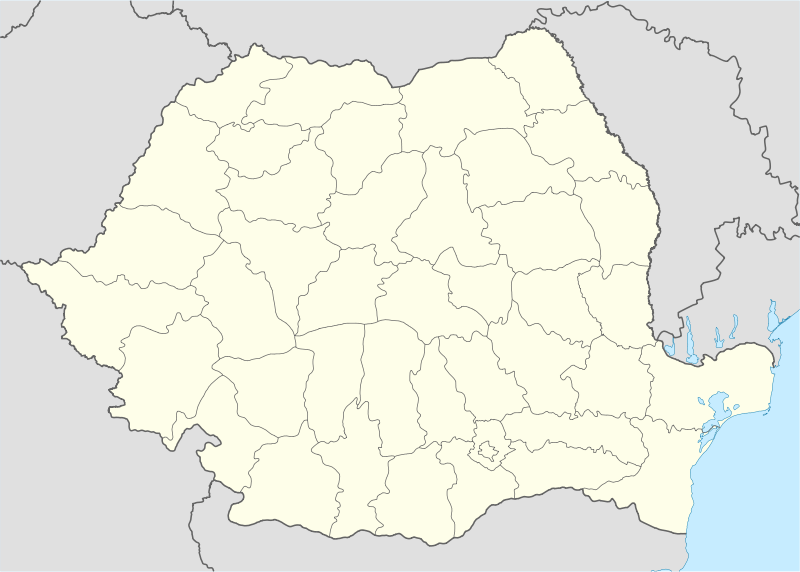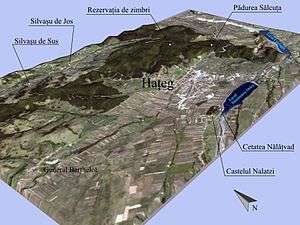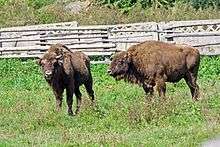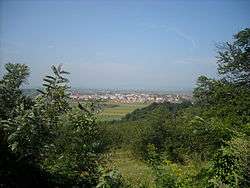Hațeg
| Haţeg | ||
|---|---|---|
| Town | ||
|
Hațeg panorama | ||
| ||
 Haţeg Location of Hațeg | ||
| Coordinates: 45°36′27″N 22°57′0″E / 45.60750°N 22.95000°ECoordinates: 45°36′27″N 22°57′0″E / 45.60750°N 22.95000°E | ||
| Country |
| |
| County |
| |
| Status | Town | |
| Government | ||
| • Mayor | Marcel Goia (National Liberal Party) | |
| Area | ||
| • Total | 64.33 km2 (24.84 sq mi) | |
| Population (2011) | ||
| • Total | 9,685 | |
| Time zone | EET (UTC+2) | |
| • Summer (DST) | EEST (UTC+3) | |
| Climate | Cfb | |
| Website | http://www.primariehateg.ro/ | |

Hațeg (Romanian pronunciation: [ˈhat͡seɡ]; German: Wallenthal; Hungarian: Hátszeg) is a town in Hunedoara County, Romania with a population of 9,340. Three villages are administered by the town: Nălațvad (Nalácvád), Silvașu de Jos (Alsószilvás), and Silvașu de Sus (Felsőszilvás). It is situated in the historical region of Transylvania.
History
In 1765, the settlement was completely militarised and integrated into the II-nd Border Company of the I-st Border Regiment from Orlați, until 1851, when that unit was disbanded.
Geology
Țara Hațegului (the Hațeg Country) is the region around the town of Hațeg. The fossils found in the Hațeg area span over 300 million years of Earth's geologic history, showing tropical coral reefs and volcanic island in the Tethys Sea, dinosaurs, primitive mammals, birds, and flying reptiles (such as Hatzegopteryx, which was named for the region).
Hațeg Island was an island during the Cretaceous Period where a dwarf species of sauropod dinosaur, Magyarosaurus dacus, lived until their extinction at the end of the Cretaceous. Baron Franz Nopcsa published articles about these Mesozoic-era archosaurs on Hațeg Island. His studies led to his theory of insular dwarfism, the notion that "limited resources" on small islands can lead to a down-sizing of the indigenous vertebrate animals.[1]
Demographics
| Historical population | ||
|---|---|---|
| Year | Pop. | ±% |
| 1912 | 3,124 | — |
| 1930 | 3,383 | +8.3% |
| 1948 | 3,210 | −5.1% |
| 1956 | 3,853 | +20.0% |
| 1966 | 5,631 | +46.1% |
| 1977 | 8,423 | +49.6% |
| 1992 | 11,616 | +37.9% |
| 2002 | 12,507 | +7.7% |
| 2011 | 9,685 | −22.6% |
| Source: Census data | ||
Natives
Gallery
 European bison in Hațeg nature reserve
European bison in Hațeg nature reserve.jpg) Struthiosaurus transylvanicus, a herbivorous reptile dating from Late Cretaceous, first discovered in the Haţeg area
Struthiosaurus transylvanicus, a herbivorous reptile dating from Late Cretaceous, first discovered in the Haţeg area The I. C. Brătianu National College
The I. C. Brătianu National College- Saint Nicholas Orthodox Church
- Historic bank building, today Hotel Ferdinand
- Reformed Church
 Synagogue
Synagogue- Nalatzi-Fay Manor, Nălațvad
 Trajan's Road near Hațeg (1900-1920)
Trajan's Road near Hațeg (1900-1920) Interior of the Greek-Catholic Church (1900-1920)
Interior of the Greek-Catholic Church (1900-1920)
See also
References
- ↑ Csikia, Z.; M. J. Bentonb (2010). "An island of dwarfs — Reconstructing the Late Cretaceous Hațeg palaeoecosystem". Palaeogeography, Palaeoclimatology, Palaeoecology. 293 (3–4): 265–270. doi:10.1016/j.palaeo.2010.05.032.
External links
| Wikimedia Commons has media related to Hațeg. |
-
 Hațeg travel guide from Wikivoyage
Hațeg travel guide from Wikivoyage - Hațeg City Hall Official Site (Romanian)


